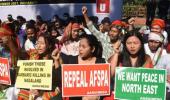The Inter-Services Intelligence (ISI), which trained a batch of Assam's United Liberation Front of Asom (ULFA) militants in 1991-92, considered the rebel group's chief Paresh Baruah a prize catch and did not want to offend him even after he was unwilling to take the agency's commands on conducting operations in the northeastern state, claims a new book.

ULFA: The Mirage of Dawn by seasoned journalist Rajeev Bhattacharyya traces the journey of the outlawed group from its inception in the late 1970s to the present, when peace is being negotiated between a faction led by Arabinda Rajkhowa and the Centre.
Baruah now heads the anti-talks ULFA (Independent) faction and is believed to be hiding somewhere in China's Yunnan province.
The first batch of ULFA militants was trained in Pakistan in 1991-92 in three groups comprising a total of about 40 cadres.
One group was trained near Peshawar and other functionaries were taken for short visits to Kandahar in Afghanistan and the arms bazaar at Darra Adam Khel near the Safed Koh mountains in Pakistan, the book says.
It says the ISI 'expected ULFA to be totally submissive, which irked Baruah no end'.
'He was not willing to bow down before the agency and accept all its diktats, such as taking regular commands for operations to be conducted in Assam. At some point, he was convinced that their association with the ISI had reached a dead end. He abruptly stood up in the last meeting and left the venue with a 'goodbye',' the author writes.
But the ISI 'knew that Baruah was a prize catch who could not be allowed to get offended'.
The agency knew that many benefits could be reaped from the ULFA, including access to other separatist groups from the northeast who could be trained in Pakistan, the book, which was launched here Saturday, claims.
'So, the agency not only allowed the second batch to complete its training but also soon instructed its officials at the embassy in Dhaka to request Baruah to dispatch the next batch. This he did, and also landed at the ISI headquarters in Rawalpandi. The spat was not only over but it had sealed a deal that was to endure for many years,' the book, published by HarperCollins India, says.
The modules offered to the cadres were of different durations ranging from 17 days to three months.
It also says that Lt Gen Asfaq Pervez Kayani, who was later appointed chief of ISI, interacted and shook hands with a batch of ULFA functionaries when they were undergoing training in that country. Kayani succeeded Gen Pervez Musharraf as the chief of Pakistan army in 2007.
The book also describes how Baruah was imprisoned for over two months in Bangladesh by the country's intelligence agency Directorate General of Forces Intelligence.
The episode unfolded in mid-1993 after a consignment of sophisticated weapons sourced from Romania in a ship was confiscated by police at Chittagong.
Baruah along with another senior functionary was taken into DGFI custody and kept at the Mirpur military cantonment after they approached the intelligence agency to release the weapons.
'DGFI was fully aware about the activities of ULFA and other rebel groups from India's Northeast in Bangladesh. But it never expected the outfit to be so brazen as to secretly import a large consignment of weapons into the country! So, Paresh and the other ULFA functionary were lodged in separate cells of the DGFI, but none was subjected to physical abuse, unlike what usually happens at such places,' Bhattacharyya writes.
The duo was released only after Baruah sat on a hunger strike inside the cell that prompted the agency to quiz them and then release them unconditionally.
The book also talks about how Baruah survived four assassination attempts in Bangladesh.
'One of the planned attempts on Paresh's life, which almost killed him, happened at the Satcherri camp in Bangladesh, ahead of Operation All Clear. It was a meticulous exercise planned at least three years in advance by the Special Branch of the Assam police. A man in his mid-twenties, named John, was indoctrinated to perform the task in return for recruitment in the police and a hefty sum of money,' it says.
However, John escaped from the camp before he could pull the trigger.
The book discusses all the major episodes related to the ULFA, delineates their causes and effects, and debunks interpretations about the movement that have gained currency over the years.
The author says the ULFA's campaign for Assam's sovereignty and independence has come at a heavy price, with long term implications.
According to an estimate by some leaders of the pro-talks faction, around 1,900 functionaries have lost their lives in the movement since the rebel group emerged.
More civilians have died in the violence, either as a result of being targeted by the group, caught in the crossfire between the rebels and security forces or exterminated by the secret killers.
But, four decades into the blood-spattered movement, the group is nowhere near achieving its goals.
Its predicament has been the same as that of other rebel organisations in the Northeast that stay on the back foot despite the aggressive counter-strategies employed by the government.
The author also asserts the ULFA cannot regain the position of strength it had in the late 1980s or in the 1990s, as the 'space for its existence has shrunk' in Assam.










 © 2025
© 2025